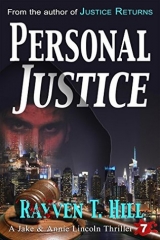
Текст книги "Personal Justice"
Автор книги: Rayven T. Hill
Жанры:
Полицейские детективы
,сообщить о нарушении
Текущая страница: 2 (всего у книги 17 страниц)
Chapter 4
Monday, 8:44 p.m.
HANK AND KING were directed to the witness waiting patiently on a bench outside the taped-off area. Earlier, the man gave his name to one of the officers as Victor Stone.
“I apologize for keeping you waiting, Mr. Stone,” Hank said, offering his hand and introducing himself and King as they approached.
Stone rose to his feet, shook the detective’s hand, and nodded at King. “I don’t mind waiting. I’m only too happy to help.”
Hank reached into an inner pocket of his jacket, removed a well-used notepad and pen, and thumbed to a blank page. He made a notation and looked at the witness.
Stone was middle-aged, a patch of grey around his temples, the rest of his head covered by a baseball cap. An ever-smiling mouth, even when he talked, gave his face a somewhat eerie appearance, especially when coupled with a frown. His slim body slouched forward at the shoulders, his blue eyes on Hank, as he tucked his hands into the pockets of his faded jeans and spoke. “I’ve never seen anything like this before. It’s rather unnerving.”
“It certainly would be,” Hank said with an understanding nod and an encouraging smile. “I’ll make this as quick as possible. I need to know exactly what you saw.”
Stone took a deep breath and pointed across the street. “I was on my way home from work—I only live a few blocks away, so I walk. I was minding my own business, not paying any attention to traffic, when I heard a gunshot, and a car squealed to a stop behind me.”
King interrupted. “Which car?”
“Actually, it must’ve been both cars,” Stone said, pointing to the Corolla in the middle of the street. “When I turned, that one was already spun around like that, but another one was stopped a little closer to me.”
“Can you describe the second car?” Hank asked.
Stone nodded. “It was a white Honda Accord. Not sure what year. Recent.”
“Plate?”
“I didn’t think to check the plate. I dove off the sidewalk out of sight behind a tree. If there was shooting going on, I didn’t want to be part of it.”
“Of course,” Hank said. “That’s the sensible thing to do.” He made a note in his pad and looked back up. “Then what happened?”
“The driver of this car,” Stone said, pointing to the Corolla, “crawled out the passenger door and the other guy got out of his. Then they started shooting at each other. The dead guy ran around to the front of his car, then crossed the street, and ran up beside that building.”
Hank looked to where Stone indicated. “He ran past the shoe store?” That was somewhat different from what he had presumed took place.
“Yes, he ran up there and the other guy followed. I heard two shots, and then the killer ran back this way and into the alleyway between the two stores.”
Hank looked toward the alley. According to Stone, the victim went around the shoe store and the shooter circled back and cut him off. “You’re sure that’s how it happened?”
Stone nodded his head adamantly. “Absolutely sure.”
“And then?”
“Then I heard two or three more shots. Not sure how many. Then the killer ran from the alley, got into his car, and left.”
“Can you describe the shooter?”
“It was pretty dark, but when he got out of the car, I saw he wore a plaid shirt. Red. Dark pants. A baseball cap.” He paused. “That’s about all I saw.”
“How tall?” King asked.
Stone shrugged. “Regular height, I guess. Not especially tall or short. I wasn’t paying a lot of attention to that. It all happened quickly.”
“Could you make out any facial features?” Hank asked.
“No. Like I said, it was dark.”
“Did either one of them speak at any time?”
Stone shook his head. “Not that I heard.”
Hank looked at Detective King. “Anything else?”
King shrugged a shoulder. “Did you notice what time it happened?”
Stone frowned and looked at the ground, thinking out loud. “I got off work at 7:00, and it would’ve been shortly after that.” He looked at King. “Maybe 7:10 or 7:15 at the latest.”
Hank made a notation, closed the pad, tucked it back into his pocket, removed a business card, and handed it to Stone. “Give me a call if you think of anything else.”
Stone took the card, looked at it briefly, and put it into his back pocket.
“Do you want a lift home?” Hank asked.
“I’ll be fine,” Stone said, pointing over his shoulder. “I don’t live far.”
Hank thanked him and he and King ducked back under the tape and went to where Rod Jameson stood. Hank told the lead investigator how the chase went down. “Make sure you check all the way around the shoe store for any trace evidence.”
“Will do.”
Hank turned to King. “That’s about all we’re going to get from here. You might as well go home. I’ll go back to the precinct. There’re a few things I need to check out, and then I’ll see if Shaft has any family. I might need to make a visit.”
“See you tomorrow, Hank,” King said without hesitation, and strode to his vehicle.
Though Hank always hated the uncomfortable task of notifying the family of victims, he would sooner King wasn’t there. The crass detective’s manner wasn’t something Hank wanted to subject them to if it could be helped.
Hank got in his car and drove to the precinct. He had a few errands that couldn’t wait until morning.
The too-small room at RHPD was a hub of activity when Hank arrived. A drug bust had gone down in the early evening, and handcuffed suspects paraded through on their way to interview rooms or jail cells.
“Ten kilos of coke, all ready for the streets,” Captain Diego informed him as Hank cut his way through the noise.
He blocked out the commotion and pulled up at his desk. A quick database search returned the personal information on Werner Shaft, complete with a picture. He would have to get Callaway to do a thorough background search later, but right now, it appeared Shaft was married, no kids. His wife’s name was Maria, same phone number as her husband—probably a landline.
He printed the information, then dialed the listed number and waited. It rang several times. No answering machine kicked in so Hank hung up. He would try again before he left for home.
He called Amelia, gave his apologies, wished her sweet dreams, and said he would talk to her in the morning. He wondered how long she would put up with his crazy hours, never knowing when he would be called in, or when he would get off.
Another computer search netted him phone numbers for the managers of the two stores near the crime scene, Nortown Bakery and Master Footwear. Both managers informed him their respective shops had been closed, with no one in the buildings during the time in question. Neither had any cameras installed outside the property, so that was a dead end.
He wrote a note for Callaway, the technical wiz everyone depended on to set up wire taps, traces, or when they needed a thorough background check done on a suspect or person of interest. He dropped the note on Callaway’s desk where he would be sure to see it first thing.
After checking out the witness’s story with his place of employment, Hank went over his notes. He didn’t have much to start with. The description of the car was too vague. Another phone call to Maria Shaft had gone unanswered, the CSI report would be awhile, so there was little else to do.
He shut down his computer, pushed back from his desk, and made his way back through the hubbub, heading for home.
Chapter 5
DAY 2 – Tuesday, 8:20 a.m.
JAKE STEPPED OFF the treadmill, wiped his brow, and did some dynamic stretches to cool down. The intense thirty-minute workout he went through each morning always made him feel refreshed, prepared for anything.
He went to the kitchen, downed almost a quart of water, took a quick shower, and dressed. Now he was ready.
Annie and Matty were in the kitchen when he came back downstairs. Matty popped the last bite of toast into his mouth, finished his orange juice, and pushed back his plate. He sighed, a troubled look on his face. “Guess I’d better get to school.”
Annie turned away from the sink, sat at the table, and looked at Matty. “Is something wrong?”
He sighed again. “Not really.”
“Did something happen at school?”
Matty looked at his mother, then shrugged and turned away, pushing back his chair.
Annie put a hand on Matty’s shoulder as he tried to stand. “Sit down, Matty. Tell me what’s wrong.”
Jake sat and leaned his arms on the table.
“Aw, Mom. You wouldn’t understand,” Matty said, his shoulders slumped.
“Try me.”
Matty raised his eyes. “It’s the girls, Mom.”
“The girls?”
“They won’t leave me alone. They think I’m some kind of hero because of what happened up north, and they keep hanging around.”
Jake laughed. “That’s a terrible problem.”
Matty looked at his father, disgust on his face. “I don’t want no girls hanging around all the time. All the guys think I’m a sissy.”
Annie ignored the bad grammar and chuckled. “The other boys are jealous, that’s all.”
Matty frowned. “You think so, Mom?”
“I’m sure of it.”
“You’ll just have to deal with it, son,” Jake said. “It happened to me when I was your age. Get used to it.”
Annie gave Jake a dry look and rolled her eyes. “Your dad is right. Well, half right. You have to put up with it and they’ll leave you alone after a while.”
Matty nodded, got up, and went to the fridge. He retrieved his lunch and stuffed it into his backpack. “Guess I’ll get going.”
“Brush your teeth first,” Annie said.
“Yes, Mom.” Matty dropped the pack on his shoulder and walked slowly from the kitchen.
Jake looked at Annie, a twinkle in his eye. “Matty doesn’t know how lucky he is.”
“Every girl loves a hero,” Annie said. “And I’ve found mine.” She stood, picked up Matty’s dishes, and put them in the sink. “I’ve got work to do.” She washed her hands and headed to the office.
The front door opened and closed; Matty was off to school. Jake washed up the dishes, put them away, and went to the office. He dropped into a chair and stretched out his long legs.
Annie hung up the phone. “That was Chris,” she said. “From Cranston’s.” Cranston’s Department Store was the anchor of the busiest mall in the area, and the retail giant occasionally turned work toward Lincoln Investigations.
Chris, as head of security, once complained to them how his department was underfunded. The owners of the store preferred to maintain a skeleton security staff and farm out work to independents if unusual circumstances demanded it.
“What does Chris need this time?” Jake asked.
“It seems like they’ve had a rash of shoplifters lately. Chris feels it’s more than that. It’s his opinion Cranston’s is being targeted by an organized retail crime ring.”
“Shoplifting networks have always existed,” Jake said. “I don’t mean your occasional person who lifts a pair of pants, or a CD. I’m talking about professionals who hit the easiest targets. Cranston’s needs to beef up security. They’ll never put a stop to it, but they can deter it.”
“Perhaps you’re right, but I think we should go and see Chris,” Annie said. “We have no other major tasks at the moment.”
“I’m ready.”
Annie called Chris back, and fifteen minutes later, Jake tapped on the door of Cranston’s security office located on the main floor of the massive store.
“Come in.”
A burly man in his late twenties rose from his desk when Jake pushed the door open. He and Annie stepped in. The man leaned over his small desk and offered a hand and a huge grin. “Welcome, guys.”
Jake shook his hand and Chris motioned toward a pair of chairs. “Sit.”
Annie sat and crossed her legs while Jake dropped into his and stretched out, folding his arms. “We’re happy to help out, Chris,” Jake said. “But I think all you people need is more security personnel.”
Chris leaned forward at his desk. “I told them that, but they aren’t willing to shell out the cash on an ongoing basis. Gave me the long lecture about how shoplifting is part of the cost of doing business.”
“That’s true,” Annie said. “But you gave me the indication it’s unusually high right now.”
“It is. It is.” Chris rubbed the stubble on his chin. “We’ve either been proved to be an easy mark, or we’re being targeted by a shoplifting ring.”
“Or both,” Jake said. “Likely both.”
“Richmond Hill PD has no organized crime unit,” Annie said. “I believe it falls under the jurisdiction of burglary, and they’re overworked and understaffed. The police don’t have the time or the resources to handle every case of shoplifting.”
“So what’s the answer?” Chris asked. “You guys can’t curb it by yourselves, and my staff is too small to make much of a dent. They don’t want to put guards at every door. It makes the shoppers feel uneasy, and that’s bad for business.”
“We have to pull it up by the roots,” Jake said.
“What does that mean?”
Jake stood and paced the small office, speaking as he thought. “If this is a ring, there’s no point in grabbing the occasional booster. They’ll just be replaced.” He stood still and looked at Chris. “We have to get to the ringleaders—to the fences, the ones who’re receiving and redistributing the stolen goods.”
“It’s not just Cranston’s,” Chris said. “Every store goes through this at one time or another. We catch a lot of shoplifters, but the professional boosters are probably getting away.”
“What about your cameras?” Jake asked.
Chris shook his head slowly. “These people are a different breed of thieves. Cameras often identify the casual shoplifter, but the organized boosters are more brazen. They often disguise themselves in some way, or avoid the cameras altogether.”
“Or they wait until no one’s paying attention and they walk out,” Annie said.
“Exactly. But if they’re seen, and even if the security tags go off at the door, cashiers and clerks do little to stop them and usually let them run. Sometimes they call the police, but by then, they’re gone.” Chris shrugged and let out a long breath. “I can’t blame them. Who wants to risk getting injured for minimum wage?”
Annie sat forward. “Leave it with us, Chris. We’ll work on it and see if we can come up with a plan of action. We might not zero in on the ringleaders, but we’ll see what we can do for Cranston’s.”
Chris grinned. “You have an idea?”
Jake looked at Annie. “We’re working on it.” He didn’t have any great plan yet, but he knew between the two of them, they’d figure something out.”
Jake stood, shook Chris’s hand, and followed Annie through the store and back out to the parking lot. “Any ideas?” he asked, as they got in the Firebird.
“Nothing yet,” Annie said.
Chapter 6
Tuesday, 9:05 a.m.
HANK SAT AT THE kitchen table in his small apartment. His pushed his breakfast dishes aside and sipped at a coffee as he reviewed his scant notes regarding the murder of Werner Shaft.
Callaway didn’t have time to take care of Hank’s request, CSI had nothing for him yet, so he submitted to the inevitable and made a phone call to Maria Shaft.
This time, there was an answer.
Hank introduced himself and asked if he could drop by to see her right away.
He heard Mrs. Shaft take a quick breath. There was a pause, and then, “Is … is this to do with my husband? He didn’t come home last night and I’m out of my mind.”
This was not something Hank wanted to do over the phone. He needed to see her in person. “Mrs. Shaft, I’ll be there in fifteen minutes.” He double-checked the address he found for Werner Shaft, was assured it was correct, and hung up the phone. He grabbed his briefcase and keys, strapped on his service weapon, and went to his car.
Hank usually enjoyed his job, but the task he now faced was one he dreaded. As he drove, he thought about the many times in the past he had to do this very same thing, and it always went the same way—denial, anger, acceptance, then mourning. And for him, it never got any easier.
The only positive aspect was the motivation it gave him to catch the culprit, and a determination to persevere until they were brought to justice.
The Shaft residence was located in a middle-class neighborhood on a mature street. There was nothing outstanding about the brick dwelling itself—a double-car garage in front, the odd plant and shrub scattered around, one car in the driveway.
He parked behind a dark-green Mazda, got out of his car, and went up the brick pathway to the front door. He took a deep breath and rang the bell.
Maria Shaft was in her midthirties, with long dark hair and a roundish face. When she answered the door, Hank saw lines of worry on her face, her unsmiling mouth set in a grim line.
He introduced himself and she showed him to the front room. He sat uneasily on the couch as she took a seat in a matching chair. She sat straight, leaned forward slightly, her hands in her lap. “Has my husband done something he shouldn’t have, Detective? He’s been arrested again, hasn’t he?”
Hank gathered his thoughts as he placed his briefcase carefully on the cushion beside him and sat back. He took a deep breath and observed her closely. “I’m afraid it’s more than that.”
She tilted her head slightly to one side, the expression on her face unchanged.
“Your husband was killed last night, Mrs. Shaft.”
Her eyes widened, her mouth opened, and she remained still a moment, then, “Killed? How? Are you sure it was him?”
Hank snapped open his briefcase, removed the printout on Werner Shaft, and held it up for her to see. “Is this your husband, Ma’am?”
She nodded. “Yes.”
Hank put the paper back in his briefcase. “There’s no mistake. It was him.”
She stared at Hank, her breathing quick and erratic. Then in a hoarse voice, barely above a whisper, she asked, “What happened?”
“He was murdered.”
Her eyes opened wider. “Murdered?”
“I’m afraid so, Ma’am. I’m sorry. I tried to reach you last night.”
“I was babysitting,” she whispered. “For my sister. I wasn’t home until late.” She paused. “Do you know who … killed him?”
“Not yet,” Hank said. “If you’re up to it, I need to ask you a few questions.”
She nodded and reached to the stand near her chair for a tissue. The tears started, and she dabbed at her eyes, sobbing quietly.
“Do you know of anyone who might’ve wanted to harm your husband?”
She hesitated and glanced aside. Finally, she looked Hank in the eye and said, “Detective, my husband was involved with some bad characters in the past. As you probably know, he did some time in prison, but I … I didn’t know any of his former acquaintances. Perhaps someone he knew before …”
That caught Hank by surprise. He hadn’t had the time to dig very deeply, still unaware of Werner Shaft’s record. That opened it up to a lot of possibilities, and it also might explain why Shaft carried a weapon.
“We’ve just started the investigation, Mrs. Shaft, so we have no suspects yet. Anything you can tell us might help.”
Maria Shaft sniffed and wiped at her nose. “I’ll help you with whatever you want to know, but I’m at a loss.”
Hank pulled out his notepad and pen and cleared his throat. “Do you and your husband have any children?”
“No, we never did.” She looked away wistfully. “Werner never wanted children and so …” Her voice trailed off, leaving Hank with the impression she unwillingly yielded to her husband’s wishes.
Hank made a notation in his pad. “So, it’s just the two of you here?”
Mrs. Shaft leaned forward. “My husband’s brother lives with us. Rocky. He occupies the basement apartment.”
Hank made another note. “Do you know if he’s home right now?”
She shook her head. “He works at the same place my husband works … worked. He’ll be there now.”
“And where’s that?”
“Werner was the warehouse manager at Richmond Distributing, and Rocky works in the shipping department.”
Hank wrote down the name and put a question mark beside it. “Do they ride to work together?”
“Sometimes. It depends on their shift. This morning Rocky took his own vehicle because my husband …”
“What kind of vehicle does Rocky drive?”
“It’s a red Ford pickup. I’m not sure what year it is.”
Hank nodded and made a note to find out what vehicle or vehicles were registered in Rocky’s name. According to the witness, the killer drove a white, Honda Accord, and Hank wanted to find out if anyone close to Werner Shaft had a vehicle with that description registered in their name.
Another part of this uncomfortable task was asking uncomfortable questions. “Mrs. Shaft, you said you were babysitting last night for your sister. I’ll need her name and address.”
Mrs. Shaft didn’t blink, perhaps not realizing Hank’s intention was to check her alibi. “Her name’s Melinda Windsor. They live at 335 Polimer Street.” She paused. “Detective, you don’t think they had anything to do with this, do you?”
“Not at all,” Hank said, jotting down the information. “I just need to fill in all the pieces.” He looked back up. “What time did you get home last night?”
“It was after eleven.”
“Did you drive there?”
“Yes, I took my car.”
Hank pointed over his shoulder. “The car in the driveway?”
“Yes.”
Hank made a final note, read through what he wrote, and tucked his notepad away. He removed a card from his briefcase, leaned over, and handed it to the grieving widow. “Call me if you think of anything that might be useful.”
“I will, Detective.” She dabbed at her eyes with the tissue, took the card, and laid it on the stand beside her.
Hank stood, wished her well, and offered to connect her with their grief counseling services.
She declined the invitation and let him out.
He got into his car and looked at his notes. He had a few people to visit and some phone calls to make. He would assign the least sensitive ones to King and look after the rest himself.
Right now, he was anxious to see what Callaway had come up with.








